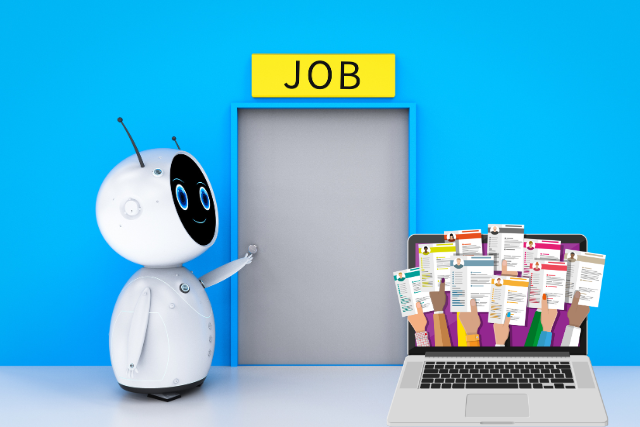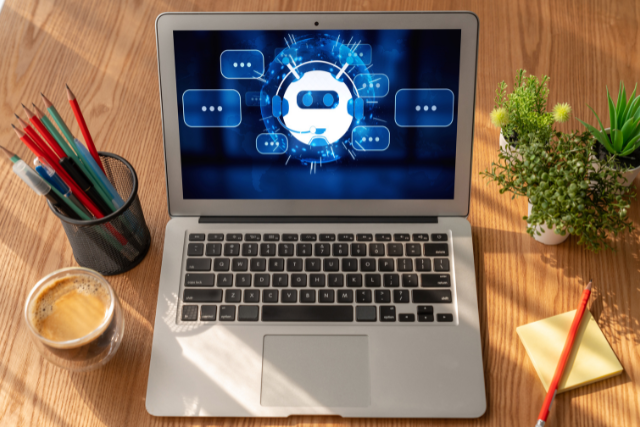Is Your Job Safe From Ai? Ranking High-Risk Roles Most Likely to Be Automated

Artificial Intelligence has become a transformative force across industries, offering efficiencies, innovations, and entirely new ways of doing business. However, with these advancements comes the looming question: Is your job safe from AI? As AI continues to evolve, it’s becoming increasingly clear that some roles are more vulnerable to automation than others.
In this article, we’ll explore the jobs most at risk, what factors contribute to their vulnerability, and how you can stay ahead of the curve.
The Rise of AI and Automation in the Workplace
AI isn’t just a futuristic concept anymore—it’s already here, deeply integrated into various sectors. From manufacturing to customer service, AI has proven its ability to handle tasks that were once the sole domain of humans. Several factors drive this shift:
- Cost-efficiency: Companies save money by automating tasks that would otherwise require human labour.
- Precision and Accuracy: AI systems can perform repetitive tasks without fatigue, reducing the margin for error.
- Scalability: AI solutions can scale operations rapidly without the constraints of human resources.
These advantages mean that more and more businesses are turning to AI, making it essential for workers to understand how their jobs might be impacted.
Jobs Most at Risk of AI Automation
Not all jobs are created equal when it comes to AI. Some roles are more prone to automation due to their repetitive nature, reliance on data, and predictability. Here’s a look at the top high-risk roles:
1. Manufacturing and Assembly Line Workers
Perhaps the most obvious examples of jobs at risk of automation are those in manufacturing. Robots and AI-driven machinery have been part of assembly lines for decades, but advancements in AI are now enabling these machines to handle even more complex tasks. This reduces the need for human workers in many parts of the manufacturing process.
2. Data Entry Clerks
Data entry roles involve repetitive tasks that AI can easily manage. With machine learning algorithms capable of accurately processing vast amounts of data, the need for human data entry clerks is diminishing. Companies are increasingly relying on AI to input, manage, and analyze data, which drastically reduces the demand for these roles.
3. Telemarketers
The telemarketing industry is also experiencing significant changes due to AI. Chatbots and automated calling systems are now capable of handling many of the tasks traditionally performed by telemarketers. These AI systems can initiate conversations, answer basic queries, and even close sales without human intervention, putting telemarketer jobs at risk.
4. Retail Cashiers
Self-checkout kiosks and AI-driven point-of-sale systems are rapidly replacing retail cashiers. These systems can handle transactions, manage inventory, and even offer customer support. As more retailers adopt these technologies, the role of cashiers is becoming increasingly redundant.
5. Customer Service Representatives
AI-powered virtual assistants and chatbots are becoming the first point of contact for customer service in many organizations. These tools can handle a wide range of customer inquiries, from simple questions to more complex issues, significantly reducing the need for human customer service representatives.
6. Truck Drivers and Delivery Personnel
The transportation industry is on the brink of a significant transformation with the advent of autonomous vehicles. Companies like Tesla, Google, and Uber are investing heavily in self-driving technology, which could eventually lead to the widespread replacement of truck drivers and delivery personnel.
7. Financial Analysts and Accountants
AI has made significant inroads into the financial industry, particularly in roles involving data analysis and accounting. AI systems can quickly analyze financial data, identify trends, and even make investment recommendations, reducing the need for human analysts and accountants.
8. Paralegals and Legal Assistants
The legal field is not immune to AI automation. AI-driven tools can now perform many tasks that paralegals and legal assistants, such as legal research, document review, and contract analysis, traditionally did. This trend is expected to continue, putting these roles at high risk.
9. Journalists and Content Creators
AI-powered content generation tools are becoming more sophisticated and capable of producing articles, reports, and even creative content with minimal human input. While AI may not yet be able to replicate the nuance of human writing, it’s already being used for routine content creation, particularly in areas like finance, sports, and real estate reporting.
10. Administrative Assistants
Tasks such as scheduling, email management, and data organization, which are typically handled by administrative assistants, are increasingly being automated by AI. Virtual assistants like Siri, Alexa, and Google Assistant are only the beginning of this trend.
Factors Contributing to Job Vulnerability
Several factors determine whether a job is at high risk of AI automation. Understanding these can help you assess your own risk and take proactive steps to safeguard your career.
Repetitiveness and Predictability
Jobs that involve repetitive tasks and predictable routines are the easiest to automate. If your job consists of performing the same actions or decisions over and over again, it might be vulnerable to AI automation.
Dependence on Data
Roles that heavily rely on data processing and analysis are also at risk. AI systems excel at managing and interpreting large datasets, often more efficiently than humans.
Lack of Human Interaction
Jobs that don’t require nuanced human interaction or emotional intelligence are more likely to be automated. AI is still not proficient in understanding and responding to complex human emotions, making jobs that require empathy and interpersonal skills safer for now.
Industry Trends
Industries that are rapidly adopting AI and automation technologies are more likely to see job displacement. Staying informed about the latest trends in your industry can help you anticipate changes and adapt accordingly.
How to Safeguard Your Career from AI Automation
While the rise of AI poses a threat to certain jobs, it also creates opportunities for those who are willing to adapt. Here are some strategies to help you stay relevant in the AI-driven workforce:
Upskill and Reskill
Investing in education and training is one of the best ways to protect your career. Focus on acquiring skills that are complementary to AI, such as data analysis, AI programming, or cybersecurity. These skills are in high demand and can help you transition to roles that are less likely to be automated.
Embrace AI
Instead of fearing AI, learn how to work with it. Understanding how AI can enhance your role and make your work more efficient will make you a valuable asset to your employer. This might involve learning how to use AI tools or even contributing to their development and implementation.
Focus on Creative and Strategic Roles
Jobs that require creativity, strategic thinking, and emotional intelligence are less likely to be automated. These roles often involve tasks that AI cannot easily replicate, such as innovation, leadership, and relationship-building. Shifting your focus to these areas can help you stay ahead of the curve.
Stay Informed
Keeping up with the latest developments in AI and automation is crucial. By staying informed, you can anticipate changes in your industry and take proactive steps to adapt. Subscribe to industry newsletters, attend conferences, and participate in online forums to stay updated.
Network and Build Relationships
Building a strong professional network can provide you with support and opportunities during times of change. Networking can help you stay informed about new roles, gain insights into industry trends, and find mentors who can guide you through your career transition.
Consider Freelancing or Entrepreneurship
Freelancing and entrepreneurship offer alternatives to traditional employment that might be less susceptible to AI automation. By offering unique services or creating innovative products, you can carve out a niche for yourself that AI cannot easily replicate.
The Future of Work in an AI-Driven World
The future of work is undoubtedly being shaped by AI. While some jobs will be lost to automation, new opportunities will also emerge. The key to thriving in this new landscape is adaptability. By staying informed, upskilling, and embracing AI, you can position yourself for success in an increasingly automated world.
The Role of Education and Policy
As AI continues to reshape the workforce, education systems and government policies must adapt to prepare workers for the jobs of the future. This could involve revising curricula to focus more on STEM (Science, Technology, Engineering, and Mathematics) subjects, promoting lifelong learning, and providing support for workers transitioning to new roles.
Ethical Considerations
The rise of AI also raises important ethical questions. How do we ensure that the benefits of AI are shared equitably? What responsibilities do companies have to their employees who are displaced by automation? Addressing these questions will be crucial as we navigate the challenges and opportunities of AI-driven work.
FAQs
1. What types of jobs are most at risk from AI automation?
Jobs that involve repetitive tasks, data processing, and limited human interaction are most at risk. This includes roles such as manufacturing workers, data entry clerks, and telemarketers.
2. Can AI replace creative jobs?
While AI is making inroads into content creation, jobs that require creativity, strategic thinking, and emotional intelligence are less likely to be fully automated. These roles often involve tasks that AI cannot easily replicate.
3. How can I protect my job from AI automation?
To protect your job, focus on upskilling, embracing AI, and shifting towards roles that require creativity and strategic thinking. Staying informed about industry trends is also crucial.
4. Will AI create new jobs?
Yes, AI is expected to create new jobs, particularly in fields related to AI development, data science, and cybersecurity. However, these roles will require different skills than those that are being automated.
5. What industries are adopting AI the fastest?
Industries such as manufacturing, finance, healthcare, and transportation are among the fastest adopters of AI technology. These sectors are seeing significant transformations due to AI-driven automation.
6. Is freelancing a safer option in an AI-driven world?
Freelancing can offer more flexibility and opportunities to focus on tasks that are less likely to be automated. However, it also comes with its own set of challenges, such as job security and income stability.






